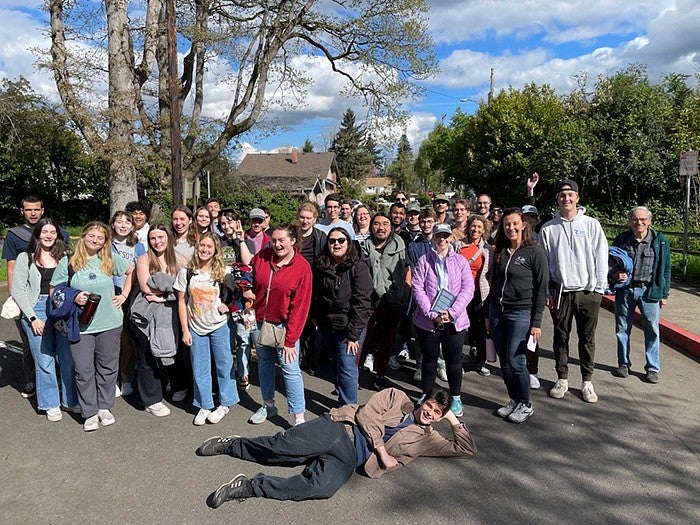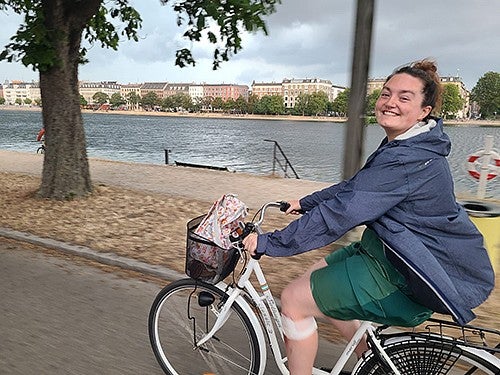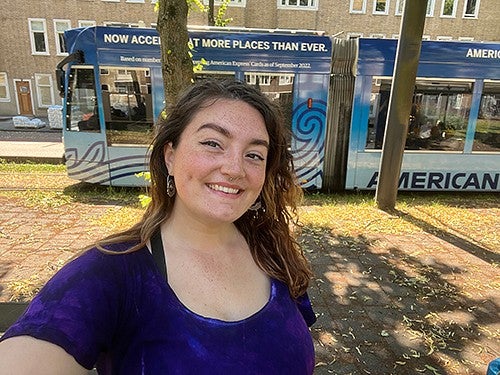
Sulwyn De Crouzuc has always felt a very strong connection to her Salem community. Her Dad was a professional skateboarder and advocated for active transportation legislation to support skateboarding as a mode of transportation. Through her experience participating in an applied project through the University of Oregon’s Sustainable City Year Program (SCYP) , Sulwyn gets to step into a role that her Dad, at the same age, was doing to support active transportation improvements in her hometown. “I am my father’s daughter,” Sulwyn reflected. “Continuing the work my Dad was doing in the 80s and 90s is just so cool.” Sulwyn is one of over 50 students taking the spring course Topics in Bicycle Transportation (PPPM 438/583) with Professor Marc Schlossberg. As Sulwyn prepares to graduate with a degree in Public Policy, Planning and Management (PPPM), she feels like this class is an accumulation of everything she’s worked for over the past four years. “I see the value of getting to take all that knowledge and implement it to help people in the community where I’m from”, Sulwyn stated. “I’m excited to see how the Salem community takes and uses the innovative ideas from students to improve the city.”
Sulwyn’s class is one of 20 courses directed at high priority projects for City Council and the Salem community. Over the 2023-2024 academic year, the City of Salem partnered with SCYP as University of Oregon students and faculty studied and made recommendations in courses that included journalism, architecture, landscape architecture, geography, nonprofit management, planning, public administration, and Portland State University engineering. Final reports from each class will continue to be added and are made available to the public. The City of Salem last worked with SCYP in the 2010-2011 academic year, making them the first repeat city to partner with SCYP.

Through SCYP classes, students get an opportunity to do a real-world applied projects. Sulywn’s class will give students the opportunity to explore the various elements involved in planning and advocating for increased utilization of bicycles as a form of urban transportation. The class project will focus on three main areas: 1) Policy and planning; 2) design, safety, and legal issues; and 3) social change. Students will be placed in groups focused on roughly 18 different City of Salem identified projects, which could include: bicycle network mapping and addressing gaps, revitalization and visioning of Edgewater Parkway and Front Street, family-friendly bikeways, perception of “cyclists” and incorporating e-bikes, bicycle storage, and updating the Transportation System Plan.
At the start of the term, students made the hourlong drive up Interstate 5 to Salem. Many SCYP classes visit the community to meet with staff, stakeholders, and experience the area. The site visit started with a review of bicycle planning projects by City of Salem staff. Additional community partners from Salem Bike Vision, Salem Bicycle Club, Oregon Department of Transportation, and Mid-Willamette Valley Council of Governments, joined students to provide additional perspectives. Students then took a guided walking tour around the city to view different types of transportation infrastructure, envision upcoming projects, and see challenges firsthand such as a line of cars parked in a bicycle lane during school pickup. For students, interacting with stakeholders helped inform their projects and influenced their thinking around proposed solutions.
As students near the end of the year, they will have the opportunity to present their ideas and recommendations. The Salem community is invited to learn about student projects at an End of Year Celebration on June 4 from 3:30-4:30 at Center 50+ (2615 Portland Rd NE, Salem, OR). Each student team will develop a poster highlighting their project, and the Salem community will have the opportunity to connect with students and ask questions about their ideas. Sulwyn shared her excitement, “the year of SCYP classes is going to be extremely beneficial for city staff to have access to a wide range of potential solutions and new ways of thinking about complex community issues.”

Through SCYP, students provide excitement, energy, and new ideas that target city challenges. Sulwyn sees tremendous value students from different backgrounds bring across a variety of disciplines in SCYP classes. As she recounted, “I have a very personal way I’m going about my project being from Salem, but there are also students from Boston, Hawaii, and even internationally. It is so valuable for a city to get diverse trains of thought and mindsets into Salem, Oregon, of all places. I think that’s so beautiful because as the capital city, there are so many things we could do differently. I’m excited about what students outside my community think about how we can make things better.”
